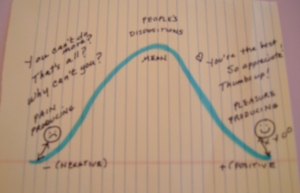
Wilco
....A continuation of last Saturday's post, with concepts and strategies to help aging parents and adult children untangle a frustrating relationship.
Concept #3 Tolerating disrespect, reinforces it. Allowing disrespectful behavior helps no one. We learn this from day one if we're teachers. When there's a bully in the classroom (to use a dramatic example), we must use our skills to stop the bullying immediately. Why? If the bully is allowed to continue, the bad behavior is reinforced to the point that it becomes part of the bully's "normal" behavior--and eventually becomes expected behavior. The bully becomes unpopular to most and his/her "victims" suffer. Teachers may be understanding and caring; but they can't allow disrespect.
O.K. You get it. Now back to Jean (featured in Saturday's post). Jean shared her situation with one of our Senior Advisors over a period of time. Our Senior Advisor's response to her: “You’re not in good spirits any more, you’re not happy. You have a husband and a family. I know you’ve said you’d feel guilty not doing for your parents like you've been doing. But when you’re not respected, you don’t have to feel guilt.”
Hearing this from a respected older person whose wisdom Jean highly valued was affirming. It was also the equivalent of supportive ammunition and Jean "got it."
So Jean is slowly disengaging. She doesn't jump to fulfill her parents' wishes. She no longer says she’s available at every request to drive them; she doesn’t cut off a phone conversation with friends when her parents call on the other line. While she still does for them, she's not at their beck and call.
The result: Her mother didn't fire the last cleaning person, in fact she's enjoying having the cleaning person around, according to Jean. And some of the errands Jean used to do are now taken over by her brothers or sister-in-laws, all of whom get along well.
Concept #4. The family is like a mobile.
I learned a bit about "family systems" through experts' presentations as part of inservice training during my years at the high school. The "family as a mobile" concept helped explain many things. Note how the beautifully-made mobiles hang in perfect balance. Similarly each family member must do his or her part to keep the family functioning in balance.
If one member is aggressive, for example, another must pull back to maintain the balance. While one is ill, another takes over some of the responsibilities temporarily. In a divorce, absent one parent, the remaining family members must do extra to make things work. (One of the most respected researchers in the field reported "even 8-year-olds can vacuum.")
True to the concept, Jean gave up some of her formerly must-do responsibilities and her aging parents readjusted, bringing in others to maintain the balance.
* * * * *
People's personalities don't change much (short of trauma or therapy) and things will probably never be perfect, yet Jean is relieved of guilt, some responsibilities, and has more time for herself and for her family. Meanwhile her parents have learned that they can no longer depend on her so heavily but can take the initiative to make their lives work. Doesn't this help parents age well?
With many thanks to Rick for permitting me to use these photos of his mobiles.
Visit his website,
to view more of his exciting work
Also visit my other site: http://helpparentsagewell.com. More resources and information







